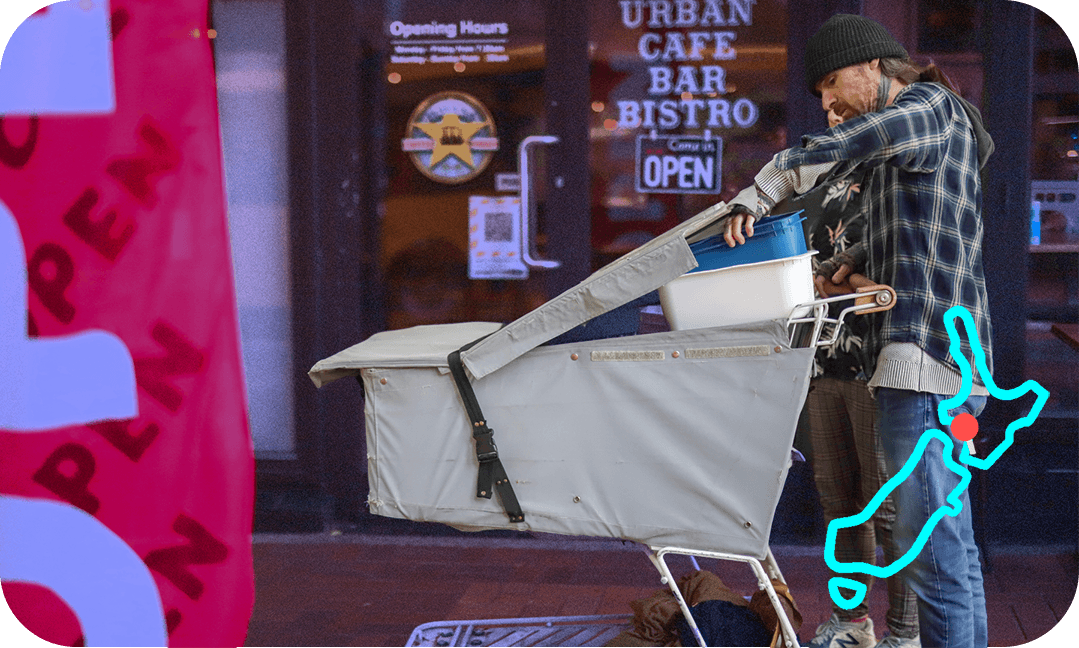In this story from the Electric Highway, Don Rowe learns about a Wellington initiative making life a little easier for those in need.
Around half-past-two most afternoons, the trolleys head out. They comb Wellington’s CBD – past the suits on Lambton Quay, through the students on the Terrace, up and down Cuba Street. The converted shopping carts with new wheels and reinforced frames, pushed by an army of volunteers, are filled with food which will be transported back to a converted shipping container outside St Peter’s church, then handed out free of charge to anyone who wants it.
After a few weeks exploring the outer edges of Aotearoa in the BMW iX, my travels have brought me back to my adopted hometown. And just down the road from my house is The Free Store, a community food rescue initiative which redistributes surplus food from the capital’s cafes and restaurants five days a week. General manager Breahn Stubbs says that on most days at least two trolleys are packed full of high quality, cafe-grade food. “If someone wouldn’t eat it, we don’t want to hand it out. Everyone should have access to quality food.”
“Then we have a van – which was kindly donated a few years ago – totally full. There will be more than 10 boxes of bread, a few boxes of Wishbone pre-prepared food, and between two and 10 boxes of food from the soup kitchen. Everything will go, every single night. If we ever have leftovers they’re passed on to council housing and other community groups that we know will be able to use it that evening or the next day.”
—
This story from the Electric Highway is brought to you by BMW i, pioneering the new era of electric vehicles. Keep an eye out for new chapters in Don’s journey each week, and to learn more about the style, power and sustainability of the all-electric BMW i model range, visit bmw.co.nz or click here.
—
The Free Store saw a reduction in patronage due to Covid-19 in 2021, but still had around 270 people volunteer over 3,800 volunteer shifts, investing 8,000 hours into day-to-day operations. Their collection volunteers walked a total of 10,500km just picking up the food. Anyone can help out, says Stubbs, with the odd shift pulled by someone initially there to receive kai.
“Having a space to go and to just get stuck in and also meet some new people is really purposeful. What people in our community tell me is that it’s a space that they really look forward to and they find a lot of joy in turning up. They really receive a lot from it. And it wouldn’t happen without them. We run on those volunteers.”
Initially inspired by a 2010 art project on Ghuznee Street, the store briefly operated out of unused retail space in the Left Bank, before being left without a location when their landlord moved the organisation on. And so, says Stubbs, a two year project began, with volunteers donating thousands of dollars of resources and time to renovate the shipping container the Store calls home.
“Our founder Ben and his friends had started this thing, people had started participating in what was happening, people were coming to receive kai and they had built relationships with cafes, then all of a sudden they had nowhere to go. And so they got a rusty old container and made it happen.”
The Free Store is open to anyone, says Stubbs. The average afternoon might see backpackers, students, whānau in transitional housing and even working professionals curious about the project stop by for fresh bread, pastas, pastries and more.
“It’s important that anyone feels like they can turn up and their need doesn’t have to be proven and they don’t have to be seen to the world as a particular type of person. Anyone can come as they are and receive kai and get involved. It’s another reason I was really drawn to The Free Store. I realised I had heaps to learn from all sorts of people who are different from me.”
As I’ve travelled the country in the iX, I’ve seen first-hand the very different shapes that sustainability initiatives can take. And while the ways it’s reflected in our more isolated or rural areas will naturally look different to our cities, kaitiakitanga is certainly a guiding principle for many in Wellington. Many local businesses are looking for ways to be more sustainable, says Stubbs, and diverting food from landfill is a way to reduce waste and the eventual greenhouse gas emissions it emits, and also to save money on disposal while giving back to the community. For other establishments, like Neo Cafe, their involvement extends further, to hosting events like Kai and Games, an initiative created by a former patron and now volunteer at The Free Store.
“The chefs make a big meal and we spread the word through the week to come down on a Thursday night to Neo Cafe, and there is a meal for anyone who wants to turn up and play board games together. We had our first one for the year this year a few weeks ago and it was so cool. Some of the people who hadn’t been to The Free Store since we last had one were absolutely buzzing. It was like a massive birthday party, just really special.”
“There’s a lot of deep care for others. Someone just told me last night that they met their first friend in Wellington through The Free Store. That’s a lot of the purpose of our mahi together.”


